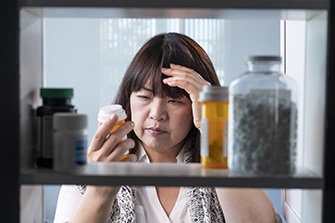Five Tips for Using Opioid Prescriptions Safely
If you’ve recently been given an opioid prescription following an injury or surgery, one issue that should be on the forefront of your mind is safety. In 2015, nearly two million people struggled with a person with substance use disorderion or abuse of an opioid-based medication. While there are times when it may be appropriate to use these medications, they are also highly addictive. In order to keep yourself and your family safe, consider these five tips for opioid use safety:
-
Use the medication for the short term and use as prescribed.
The cardinal rule of prescriptions is taking them as directed by your doctor. In most cases, opioid medications should be prescribed for a very short duration, no more than a week’s supply. If you think you won’t need as much as your doctor wants to prescribe, talk with him/her about your concerns, or ask for a lower dosage or a non-opioid painkiller. You should leave the doctor’s office knowing exactly when and why you’ll need to take your opioid-based prescription.
-
Find a safe spot to store meds.
Keep your prescription in a safe spot out of easy access by others, especially children. You need to make sure that your medication does not fall in to the wrong hands. If you have children in the house, put medications for adults in an entirely different place than medications for children to avoid accidental mix-ups. Consider putting dangerous medications in a lock box, especially when young children are in the home.
-
Keep your paperwork.
Your medication bottle should always be side-by-side with your prescription for the medicine. In the event of an accidental overdose, paramedics will be able to tell exactly what and possibly how much of your medication has been ingested. If you are traveling, wary security guards checking your bag at large events or major transportation hubs will have no reason to be suspicious.
-
Dispose of your excess properly
. A recent study conducted by John Hopkins Bloomberg School of Public Health suggested that an astonishing 60% of people prescribed opioid-based medications had some amount left over beyond their original prescription period. That’s a lot of pills waiting around to be misused. Many people share these excess pills with others. Avoid the temptation to “be kind” by giving someone else your drugs. Contact your pharmacy and ask how you should dispose of excess medication. Do not flush excess medications.
-
Open the conversation about medications with your doctor and your family
Any time you are given opioid prescriptions that have the possibility of being addictive, have a conversation with your health care provider about any concerns you have about your own past substance abuse or history of substance abuse in your family. Also, begin a dialogue in your household about the proper use of medications and the pitfalls of abuse and ultimately addiction. Your whole family will benefit from engaging in candid conversation about substance abuse.
Recovering from any major injury or health issue is already challenging enough without adding threat of addiction as well. Be smart about how you use and store your opioid prescriptions; you’ll minimize the threat of abuse and protect yourself from further unnecessary hardships.
The Best Call You Will Ever Make
Call Now to Speak Confidentially with an admission counselor.
